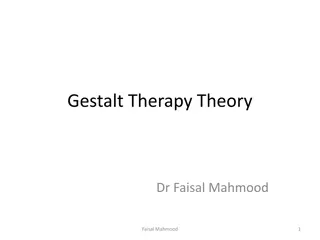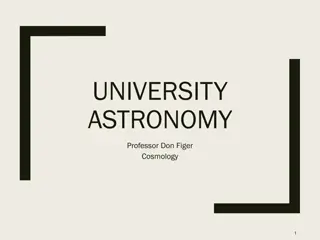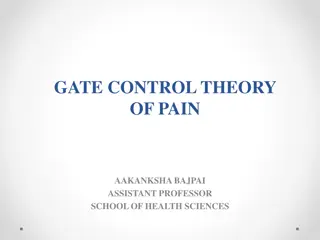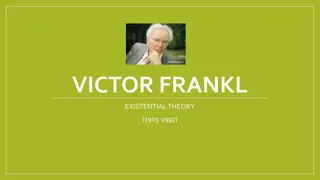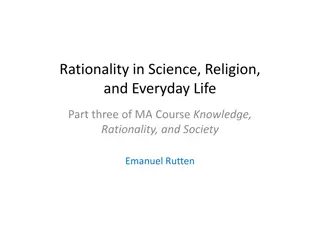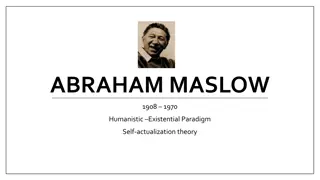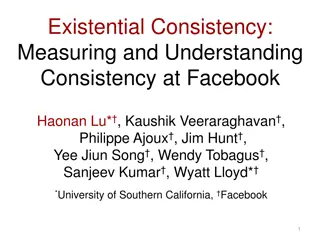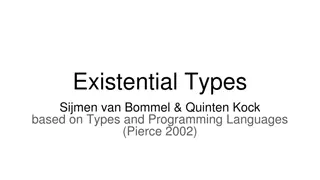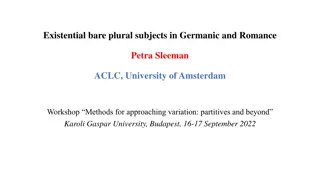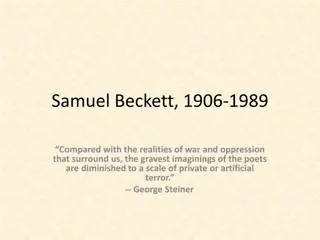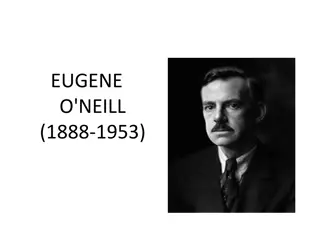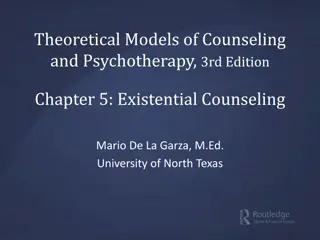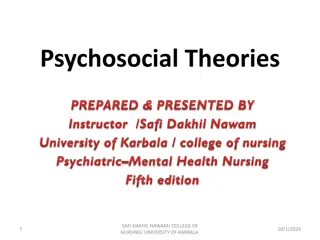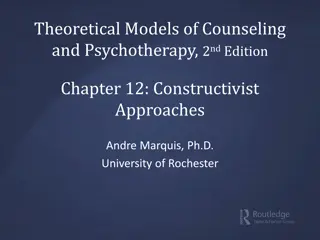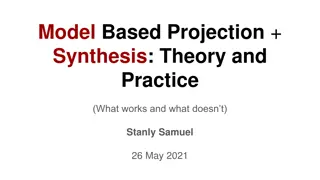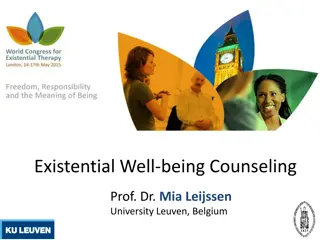Ginzburg Landau phenomenological Theory
The Ginzburg-Landau phenomenological theory explains superconductivity and superfluidity as distinct thermodynamic phases. It focuses on phase transitions characterized by singularities in specific heat at the transition temperature. Derived from BCS theory, it quantifies condensation energy, emphas
1 views • 38 slides
Crystal Field Theory in Transition Metal Complexes
Crystal Field Theory (CFT) explains the colors and magnetic properties of transition metal complexes. It focuses on the energy changes in d-orbitals of metal ions caused by surrounding ligands. This theory, developed in 1929, provides insights into the bonding interactions in complex compounds. The
10 views • 44 slides
Understanding Social Learning Theory and the Power of Example
Social Learning Theory, introduced by Bandura, emphasizes learning through observation and modeling. It explores how individuals acquire behavioral dispositions, trial-and-error experiences, and the impact of stimuli in the environment. The theory focuses on the importance of attention, retention, a
1 views • 17 slides
Evolution of Mathematical Theories and Proof Systems
Development of mathematical theories such as model theory, proof theory, set theory, recursion theory, and computational complexity is discussed, starting from historical perspectives with Dedekind and Peano to Godel's theorems, recursion theory's golden age in the 1930s, and advancements in proof t
1 views • 29 slides
Introduction to Organizational Behavior: Management Theories and Practices
Explore the evolution of organizational behavior from early management theories to contemporary practices. Understand the historical foundations and relevance of management theory in shaping workplace dynamics. Delve into key concepts like Scientific Management, Administrative Management, Bureaucrat
1 views • 28 slides
Theories on the Origin of State: Divine, Force, Patriarchal, and More
Various theories such as Divine Origin, Force Theory, Patriarchal Theory, and others explain the origin of the state. Divine theories attribute state creation to God, while Force Theory emphasizes the strong subjugating the weak to establish authority. Each theory offers unique perspectives on the h
1 views • 24 slides
Understanding Gestalt Therapy Theory with Dr. Faisal Mahmood
Explore the basic concepts of Gestalt therapy theory with Dr. Faisal Mahmood. Delve into phenomenology, field theory, and dialogical relationship. Learn the holistic, process-oriented, and existential approach to human change focused on awareness and personal responsibility.
0 views • 101 slides
Understanding Forgetting: Theories and Influence on Memory Recall
Forgetting is a complex phenomenon influenced by theories such as Decay Theory, Interference Theory, and Motivated Forgetting. The Ebbinghaus forgetting curve highlights how memories fade over time. Decay Theory suggests memories decay over time, while Interference Theory explains how old and new me
0 views • 25 slides
Psychological Theories of Criminality: Understanding the Roots
Psychological theories of criminality delve into the association between intelligence, personality, learning, and criminal behavior. Major theories include Psychodynamic Theory by Freud, Behavioral Theory by Bandura, and Cognitive Theory by Kohlberg. These theories explore how unconscious mental pro
1 views • 20 slides
Exploring Cosmology: A Journey Through the Universe's Mysteries
Delve into the fascinating field of cosmology with Professor Don Figer as he unravels the big bang theory, cosmological observations, and ponders the fate of the Universe. Learn about the origins of cosmology, its elements, history from Aristotle to Newton, and the evolution of our understanding of
0 views • 56 slides
Austin's Theory of Law by Rinkey Sharma: An Overview
Austin's Theory of Law, presented by Rinkey Sharma, delves into the Imperative Theory of Law as proposed by Austin, known as the father of English jurisprudence. It explores General and Particular Jurisprudence, Austin's definition of law, and the elements of positive law, emphasizing the concepts o
0 views • 11 slides
Theories of International Relations Overview
The field of International Relations (IR) encompasses various theories that seek to explain global phenomena, drawing from disciplines like history, philosophy, and economics. Theory, derived from contemplation and speculation, organizes ideas to explain issues such as state emergence, conflict caus
1 views • 47 slides
Understanding the Gate Control Theory of Pain in Pain Management
This detailed content delves into the Gate Control Theory of Pain, explaining pain pathways involving nociceptors, A-delta fibers, and C fibers. It further explores central pain pathways like the spinothalamic tract, spinomesencephalic tract, and spinoreticular tract. The theory's mechanism of pain
3 views • 11 slides
Overview of Cooperative Game Theory and Bargaining Solutions
Cooperative game theory explores situations where players have mutual benefits in cooperating. The focus is on bargaining solutions to reach agreements despite conflicting interests. Key concepts include Nash Bargaining Solution, Kalai-Smorodinsky Bargaining Solution, and Rubinstein Bargaining Proce
1 views • 24 slides
Understanding the Theory of Firms: Neoclassical vs. Modern Approaches
The theory of firms is explored through the Neoclassical and Modern perspectives. Neoclassical theory focuses on profit maximization, while Modern theory delves into managerial, principal-agent, and transaction cost theories. The discussion covers criticisms of Neoclassical theory and the essential
1 views • 79 slides
Victor Frankl's Existential Theory and Logotherapy
Victor Frankl, a prominent figure in existential psychology, developed the theory of logotherapy, emphasizing the pursuit of meaning as a primary motivator for human beings. He believed in the freedom to choose and take responsibility, transcending mere animal existence to live a meaningful life. Fr
0 views • 47 slides
Rationality in Science, Religion, and Everyday Life: Exploring Belief Formation and Rational Decision-Making
Explore the essence of rational belief formation across science, religion, and daily life through the lens of cognitive processes, decision-making, and value systems. Delve into the conditions for rational belief, practical decision-making, and axiological rationality to understand human cognition a
1 views • 142 slides
Theories of Causation in Psychological and Social Sciences
Overview of theories of causation categorized into psychological, social psychological, and sociological perspectives. Psychological theories focus on instinctive, biological, and psychological qualities of abusers, including Attachment Theory, Psychodynamic Theory, Social Learning Theory, and Situa
0 views • 15 slides
Understanding Abraham Maslow's Humanistic Existential Paradigm
Explore the key concepts of Abraham Maslow's humanistic existential paradigm, including self-actualization theory, perspective, and views on need gratification. Learn about Maslow's belief in human potential, the motive for self-actualization, and the importance of need gratification in realizing in
1 views • 81 slides
Understanding Political Theory through a Contextual Approach
Exploring G.H. Sabine's perspective on political theory through a contextual approach, emphasizing the importance of historical context and societal influences. Sabine argues that while political theory evolves with its contemporary politics, it should be analyzed within its specific time and social
0 views • 9 slides
Evolution of Light Theory: From Wave Theory to Quantum Theory
At the turn of the century, the discovery of the photoelectric effect challenged the wave theory of light, leading to the development of the quantum theory by Max Planck and Albert Einstein. This new theory introduced the concept of discrete energy units known as quanta, bridging the gap between wav
1 views • 62 slides
Dp-branes, NS5-branes, U-duality, and M-Theory Overview
Overview of Dp-branes, NS5-branes, and U-duality derived from nonabelian (2,0) theory with Lie 3-algebra. Introduction to M-theory, including M2-branes and M5-branes in the strong coupling limit. Discussion on BLG theory, Lorentzian Lie 3-algebra, and the ABJM theory for M2-branes.
1 views • 32 slides
Understanding Consistency at Facebook: A Study on Existential Consistency
This study explores the measurement and comprehension of consistency at Facebook, focusing on existential consistency. Key topics covered include consistency performance, fundamental tension between consistency and performance, anomalies in Facebook systems, and strategies for quantifying and preven
0 views • 30 slides
Understanding Time-Independent Perturbation Theory in Quantum Mechanics
Perturbation theory is a powerful tool in solving complex physical and mathematical problems approximately by adjusting solutions from a related problem with known solutions. This theory allows for more accurate approximate solutions by treating the difference as a small perturbation. An example inv
0 views • 19 slides
Ethical Theories: Divine Command vs. Virtue Theory Explained
Divine Command Theory asserts that morality is derived from God's commands, contrasting with Virtue Theory which focuses on developing moral virtues to achieve human flourishing and excellence. Divine Command Theory relies on religious texts, while Virtue Theory emphasizes the cultivation of virtues
0 views • 24 slides
Understanding Existential Types and Type Manipulation in Programming Languages
Explore the concepts of existential types, type abstraction, type ambiguity, packing, and unpacking in the context of programming languages. Learn how to work with hidden types, universal types, and the nuances of type manipulation. Examples and illustrations are provided to enhance understanding.
0 views • 17 slides
Understanding Fermi Liquid Theory in Interacting Fermion Systems
Fermi liquid theory, also known as Landau-Fermi liquid theory, is a theoretical model that describes the normal state of metals at low temperatures. Introduced by Landau and further developed by Abrikosov and Khalatnikov, this theory explains the similarities and differences between interacting ferm
0 views • 23 slides
Existential Bare Plural Subjects in Germanic and Romance Languages
Workshop explores the variation in using existential bare plural subjects in English, Dutch, Spanish, Italian, and other languages, presenting different linguistic analyses and theories regarding their occurrence across Germanic and Romance language families.
0 views • 49 slides
Insights into Samuel Beckett's Existential World: A Reflection on Language and Despair
Delve into the poignant world of Samuel Beckett, exploring themes of existential despair, the futility of language, and the human condition through his renowned works like "Waiting for Godot" and "Endgame." Through introspective quotes and character sketches, this exploration offers a glimpse into B
0 views • 10 slides
Computational Learning Theory: An Overview
Computational Learning Theory explores inductive learning algorithms that generate hypotheses from training sets, emphasizing the uncertainty of generalization. The theory introduces probabilities to measure correctness and certainty, addressing challenges in learning hidden concepts. Through exampl
0 views • 43 slides
Automata Theory and Theory of Computation Overview
This course overview covers concepts in automata theory and theory of computation, including formal language classes, grammars, recognizers, theorems in automata theory, decidability, and intractability of computational problems. The Chomsky hierarchy, interplay between computing components, modern-
0 views • 42 slides
Theories of Interest in Microeconomics II
Explore various theories of interest in economics, including the Classical Theory, Liquidity Preference Theory by Keynes, Productivity Theory, Abstinence Theory, Time-Preference Theory, Fisher's Time Preference Theory, and the Loanable Fund Theory. These theories offer different perspectives on the
0 views • 6 slides
Exploring the Evolution of Atomic Theory
Delve into the historical journey of atomic theory starting from Democritus and Aristotle's views to modern advancements proving some aspects of Dalton's theory incorrect. Learn about key laws and theories such as the Particle Theory of Matter, Dalton's Atomic Theory, and JJ Thomson's discoveries, s
0 views • 30 slides
Eugene O'Neill - The Pioneering American Playwright
Eugene O'Neill (1888-1953) was a trailblazing American playwright, renowned for his exploration of the human condition, spirituality, and existential themes in over 60 plays. His works delved into the relationship between man and God, the struggle for belonging and purpose, and the search for meanin
0 views • 28 slides
Understanding Existential Counseling: Philosophy and Practice
Existential counseling is rooted in the philosophy of existentialism, focusing on concepts such as responsibility, freedom, and the unique subjective perspective of each individual. Rollo May's influence in this approach, along with the ontological and phenomenological underpinnings, shape the under
0 views • 24 slides
Overview of Psychoanalytic Theories in Psychiatric Mental Health Nursing
Explore the fundamental beliefs and treatment modalities of psychosocial theories such as psychoanalytic, developmental, behavioral, existential, and crisis intervention. Learn about the influence of these theories on current nursing practices, with a focus on the foundational contributions of Sigmu
0 views • 40 slides
Constructivist Approaches in Counseling and Psychotherapy: A Philosophical Perspective
Constructivist approaches in counseling and psychotherapy emphasize the ongoing process of structuring experiences to create meaning. This perspective involves philosophical underpinnings from thinkers such as the Buddha, Immanuel Kant, and Jean Piaget, highlighting the role of individual constructi
0 views • 35 slides
Macromechanical Analysis of Lamina and Tsai-Hill Failure Theory Overview
The Tsai-Hill failure theory is based on the strengths of a unidirectional lamina, incorporating longitudinal and transverse tensile and compressive strengths, as well as in-plane shear strength. This theory, derived from the distortion energy theory, provides criteria for determining lamina failure
0 views • 15 slides
Understanding Model-Based Projection Synthesis Theory and Practice
Explore the theory and practical application of Model-Based Projection Synthesis (MBP) in solving problems related to quantifier elimination, validity of first-order logic fragments, and witness synthesis. Learn about solving existential quantifier sentences and extracting witnesses in the context o
0 views • 56 slides
Explore Existential Well-being with Prof. Dr. Mia Leijssen
Dive into the realm of existential well-being through experiential exercises and reflections guided by Prof. Dr. Mia Leijssen from the University of Leuven, Belgium. Explore the dimensions of human existence – physical, social, psychological, and spiritual – to discover more about yourself and y
0 views • 28 slides






